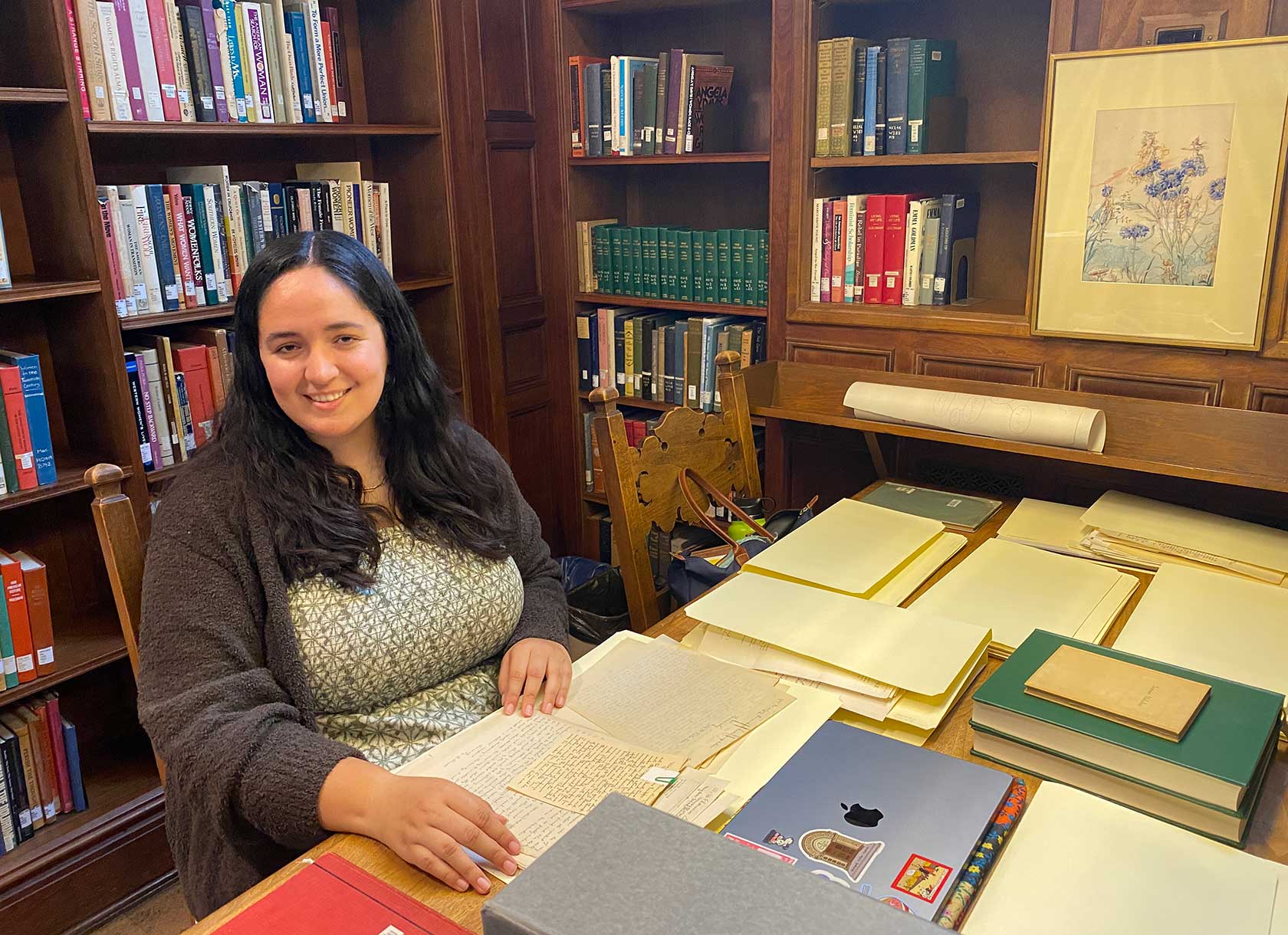By Kendra Pintor

When Mena Bova ’24 first learned about the Ellen Browning Scripps Summer Research Internship, she was intrigued. Although Bova was a rising senior, she felt like she still didn’t know much about the College’s founder and namesake. She became even more intrigued when she learned that the internship would focus on examining Miss Scripps’ own book collection.
“I am a firm believer that one of the best ways to learn about a person’s interests, likes, fascinations, and hobbies is through the literature they gravitate toward—especially the literature they enjoy enough to buy,” says Bova.
According to Director and Sally Preston Swan Librarian for the Ella Strong Denison Library Jennifer Martinez Wormser ’95, the library hosts several undergraduate student internships during the summer, which provides students with the opportunity to hone their research skills and spend their days “knee-deep in the archives.”
“My role is to support students throughout their discovery process, connect them to relevant resources, and create a supportive environment conducive to inquiry,” says Martinez Wormser. “In Mena’s case, that means introducing her to the Ellen Browning Scripps Papers and related ancillary materials, checking in with her regularly about her progress and discoveries, and helping her navigate her list of questions about Ellen Browning Scripps and the role books played in her life.”
What surprised Bova the most during her research was that, in addition to her love of collecting books, Ellen Browning Scripps was also a literary benefactor. She funded W.L. Dawson’s Birds of California ornithology books project, an endeavor that spanned a decade. Despite a plethora of challenges, including World War I, shipwrecks, financial difficulties, and arson, Miss Scripps generously invested more than $100,000 to make decades of California bird research accessible to a wider audience.
“Despite knowing she likely would not make all of her money back, she still consented to fund the books,” explains Bova. “When the publishers didn’t sell all of the copies they had made, she asked her lawyer to have a copy sent to every junior college and high school in California—all on her dime. To me, this represents her interest in knowledge for knowledge’s sake.”
One of the obstacles Bova encountered during her research was that although Scripps received the majority of Ellen Browning Scripps’s library, certain books related to her other interests were donated elsewhere. Miss Scripps had a substantial collection of non-fiction books on natural history, which went to the San Diego Natural History Museum, an institution she generously supported. Fortunately, an accession list created by the executors of her estate facilitated Bova’s investigation. This allowed her to gather additional information about Miss Scripps’ wide-ranging interests, which included medicine, Egyptian history, and modern art. Bova even planned a trip to the San Diego Natural History Museum’s Research Library, where she examined some of Miss Scripps’ natural history books in person, further enriching her research.
Bova’s research represents the second student-led exploration of Miss Scripps’ documents, the first of which culminated in an interactive website designed by Isabel Li ’25 and Amalia Koch ’25. “With financial support from the Josephine Stedem Scripps Foundation, we have been able to support summer interns—like Mena—for the last two years, encouraging more in-depth study and a deeper understanding of Ellen Browning Scripps, her life, and her world,” says Martinez Wormser.
Ultimately, Bova’s goal is to bridge the gap between the name Ellen Browning Scripps and the woman herself by unraveling the narrative embedded within her bookshelf.
“I’m hoping to potentially contribute an article to Scripps magazine’s From the Archives section about the scope of Miss Scripps’s book collection, as well as how it relates to her life, interests, and hobbies,” says Bova. “I also plan to create some social media posts to make it easier for students to have access to this information. In addition, I’ll be presenting at the annual Scripps Summer Research Tea.”
Bova hopes to enable students and community members to forge a deeper connection with the remarkable woman whose legacy continues to inspire Scripps College.
“From sweatshirts to pamphlets to signs, the Scripps name is omnipresent on our campus,” says Bova. “Despite that, it’s easy to feel disconnected from the woman behind the name. Prior to this summer, I often felt that disconnection. Through this research, I hope to make it easier for students and other community members to go beyond the name and learn about the woman.”

